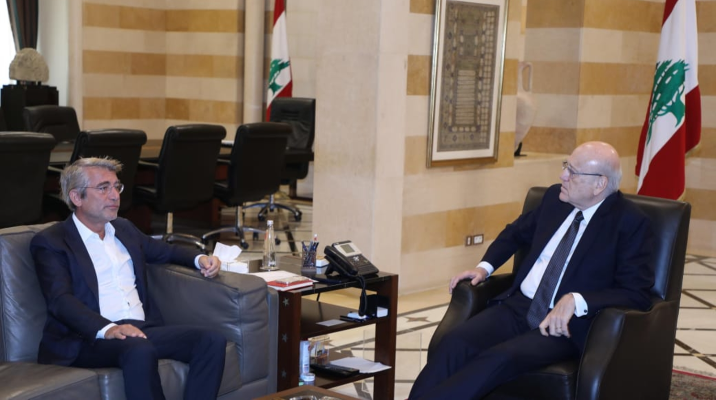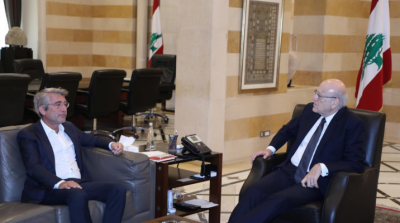Energy and Water Minister Walid Fayad, following his meeting with Prime Minister Najib Mikati, stated that he updated Mikati on the latest developments regarding the electricity crisis. He noted that the Prime Minister played a role in addressing the issue over the past two days by securing diesel from oil facilities, despite some administrative hurdles due to a lack of decision-making authority. Fayad mentioned that the bureaucratic decision-making processes delayed actions significantly, which became evident during this crisis; it could have been avoided if the available diesel had been utilized promptly. He had proposed two different methods for supplying the power plants with diesel: one through the army and its reserves, and the other through the facilities as a loan, although various administrative mechanisms were involved, the objective remained the same.
Regarding the renewal of Iraq's commitment, Fayad indicated that Iraq, both its leadership and people, confirmed their support for Lebanon and committed to supplying Lebanon with heavy fuel oil, extending and renewing the agreement. Additionally, there is a commitment to increase the quantities this month to 125,000 tons instead of 100,000 tons, expected to be loaded from Iraq on the 26th of this month. Fayad also mentioned that they are in the process of implementing an agreement for the exchange of crude oil with Iraq, which would lead to an increase in quantities, and Iraq reaffirmed its commitment to this. He stated that he had contact with Minister Hayan Abdul Ghani and the Iraqi government leadership, who expressed a desire to expedite the execution of this matter to ensure multiple sources for fuel, not just one.
Fayad emphasized that the strategic issue that confronted Lebanon during this crisis stemmed from reliance on a single source, suggesting that dependence on multiple sources is preferable. They have been prepared for some time to obtain spot cargo, though there were concerns that this might annoy the Iraqis. The electricity director general had requested coverage from Prime Minister Mikati in a written decision, but it was in fact necessary to have another source for importing fuel to avoid power outages. It was noted that a tender was conducted in June and temporarily awarded in early July, but they waited more than ten days for the final signing to ensure the electricity company was ready to accept the goods. However, this was tied to a cabinet decision, which led to a delay.
He assured that today, Algeria's role is emerging in the resilience fight, and friends of Lebanon are stepping forward since it has become clear that Lebanon can rely on both Iraq and Algeria. They agreed with the Algerians on the guidelines and standards of this gift in terms of quantity and quality, stating that they need two types of gas oil for Deir Ammar and Zahrani, plus the need for "Grade B" fuel oil for the Zouk and Jiyyeh plants.
Fayad explained that when the Algerian president realized Lebanon was in crisis, he took steps to support Lebanon, highlighting that Algeria teaches the meaning of resistance and existence in freedom, which is represented in their assistance. He hopes this will open a door for stronger ties, especially in energy and other areas, and also noted that Algeria supplies gas to most European countries. He believes that acquiring even a small portion from Algeria could reduce electricity costs for Lebanon, although it will require time to cultivate such cooperation.
Concerning the gradual restoration of electricity supply, Fayad mentioned that they currently have 200 megawatts from diesel loans that will last until the end of the week. If more is needed, "the tap can be opened," and the electricity company could reassess these quantities. It is expected that the approvals from the Central Bank of Lebanon and the Electricity of Lebanon will be finalized, posing no obstacles to filling spot cargo from Egypt, which will be available in Lebanon on August 26, raising the electricity supply gradually to 600 megawatts. This level was previously available during a relatively stable period, providing about 5 to 6 hours of electricity.
Fayad concluded by stating that a fundamental improvement would commence at the beginning of next week. Additionally, soon and in the fall, the Zouk and Jiyyeh plants, which can provide 200 megawatts, will be activated as per the Board's decision, which has been delayed. These plants can supply an additional 200 megawatts over the 600, potentially reaching 800 megawatts. The fourth group in Deir Ammar and Zahrani could likewise increase supply by 200 megawatts, reaching a total of 1,000 megawatts if adequately fueled. This represents their fundamental ambition, and he expressed hope for more cooperation to achieve their goals of increasing and sustaining electricity supply with diversified sources.




